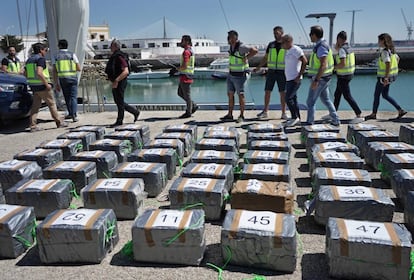Spain becomes Europe’s top interceptor of cocaine
Seizures have increased by 5,000% since 1987, which is when the drug was first introduced into the country

For three decades, Spain has been controlling the importation of cocaine, which has multiplied at an unstoppable rate since Europe’s first drug transportation and distribution cartels emerged in Galicia in northwestern Spain. Police files and statistics reveal telling details on the history of the drug, which officially appeared in the country in 1987, when the Interior Ministry began documenting the number of seizures. Since then, and up until 2018, seizures have increased by 5,000%, a figure which represents the largest volume of seized drugs from surrounding European countries.
In 1987, Spanish police destroyed just one ton of cocaine – in 2017, that figure had jumped to 50
The fight against drugs has taken a tremendous toll on the country, both economically and in terms of public health. For the past 10 years, Spain (alongside the United Kingdom), has ranked first in the European Union for cocaine consumption. In 1990, it ranked last. Authorities have not yet managed to curb the upward trend in the past decade, both in terms of trafficking and consumption.
In 1987, three years before Operation Nécora, a major police operation against drug traffickers in Galicia, just one ton of cocaine was destroyed. In 2017, police officers destroyed 50 tons, and the figures continue to rise. The effects of the overproduction of cocaine in Colombia was particularly evident in 2018, when the largest shipment of cocaine on a container ship in Europe was intercepted in Algeciras, and then in Málaga. The two shipments, which amounted to almost 15 tons of cocaine, came from South America and were hidden among bananas.
“The 1980s were a taste of what the future could be like, when Europe was only just beginning to use drugs, and is now a reference point of where we find ourselves today – facing overproduction of cocaine in Colombia, which is already considered a crisis,” explains Antonio Duarte, commissioner of the Central Narcotics Brigade.
There is more cocaine than ever, but we have also managed to deal major blows to the traffickers
Antonio Duarte, commissioner of the Central Narcotics Brigade
“We remain cursed by drugs because we are the country that intercepts the largest amount of drugs in Europe and are one of the world’s leaders in police strategy, and so we cannot lower our guard,” says the commissioner. “There is more cocaine than ever, but we have also managed to deal major blows to the traffickers.”
Although the entry of cocaine into Spain via the coast of Galicia was first registered by police in 1987, there is evidence the drug was introduced at least two years before. The profitable tobacco networks stopped smuggling cigarette packets from the fear created by the largest police raid against smuggling. The tobacco business was severely punished, much more than hashish trafficking because cocaine was still considered a silent crime.
A joint offensive
While the first air transport networks of cocaine were operating in Mexico, dispatching small planes full of drugs produced by the Medellin cartel under Pablo Escobar to the United States, the Galician smuggling bosses were just beginning their maritime operations.
Mexico and Spain thus became fertile ground for drug trafficking, causing then unthinkable economic and health consequences, and changing police strategy in Europe and the United States forever.
Unlike the first cartels that emerged in Spain to transport and distribute cocaine to Europe, the Mexican drug cartels plunged their country into a long and bloody struggle for control – not just over the markets and Colombian territories but also over production, which has spread to heroin and marijuana.
For the past 10 years, Spain has ranked first in the European Union for cocaine consumption. In 1990, it ranked last
Despite the setbacks the Galician organizations have endured in the past 30 years, they have managed to maintain a solid and profitable market, with the average price per kilogram remaining almost unchanged (€32,000). There are barely four groups left with the ability to ship large quantities of drugs as police pressure has forced traffickers to explore territories and partners in countries new to cocaine trafficking. Turkey, for example, is one of the preferred destinations to buy or rent ships.
The next battle against drugs will be led from Spain. It has been planned In meetings held in mid-December in Bogotá and Medellín (Colombia), attended by Spanish police, the National Police Anti-Narcotics Directorate of Colombia (Diran) and the Directorate of Criminal Investigation and Interpol (Dijin). It will be a joint offensive in a bid to control the origin and the destination of the shipments.
One of their tactics will be based on international cooperation, trying to find allies in European countries, and, for the first time, in African ones. Spain’s priority is to involve the governments of Morocco, Mauritania and Guinea, who form the main strategic points to hide and ship cocaine to Europe.
English version by Asia London Palomba.
Tu suscripción se está usando en otro dispositivo
¿Quieres añadir otro usuario a tu suscripción?
Si continúas leyendo en este dispositivo, no se podrá leer en el otro.
FlechaTu suscripción se está usando en otro dispositivo y solo puedes acceder a EL PAÍS desde un dispositivo a la vez.
Si quieres compartir tu cuenta, cambia tu suscripción a la modalidad Premium, así podrás añadir otro usuario. Cada uno accederá con su propia cuenta de email, lo que os permitirá personalizar vuestra experiencia en EL PAÍS.
¿Tienes una suscripción de empresa? Accede aquí para contratar más cuentas.
En el caso de no saber quién está usando tu cuenta, te recomendamos cambiar tu contraseña aquí.
Si decides continuar compartiendo tu cuenta, este mensaje se mostrará en tu dispositivo y en el de la otra persona que está usando tu cuenta de forma indefinida, afectando a tu experiencia de lectura. Puedes consultar aquí los términos y condiciones de la suscripción digital.








































